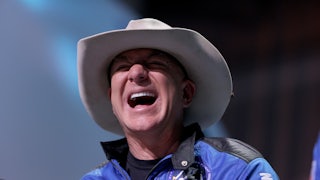Stop me if you’ve heard this one before. An erratic, buffoonish Republican with dangerous ideas is rising in the polls and surging into contention in his party primary. Democrats, fearing the possibility that the primary might produce a nominee palatable enough to make inroads with moderates, see the more extreme candidate as an easy mark and boost his candidacy. In some instances, they open their own wallets, spending big on elaborate ad buys that help him broaden his appeal with primary voters. This guy, after all, is too crazy to win the general election, right?
Much of what I’ve described above is, basically, the plot of the movie Trump ’16. Yes, Donald Trump had the bull by the horns for most of the nomination process, only briefly trailing in the polls. Nevertheless, Democrats routinely made it clear that he was who they wanted to face in the general election. He was simply too easy to beat: He would alienate moderates and many conservatives, possibly generating a historic wave election and Democratic supermajorities in the process. We all know what happened next.
Six years later, Democrats find themselves facing the same set of perverse incentives in the Pennsylvania gubernatorial race. Doug Mastriano, the Pennsylvania state senator who won Tuesday night’s GOP primary, is one of the most extreme candidates that Trump has endorsed this cycle—and was one of his most loyal allies in the state when the former president was challenging the 2020 election. He was at Trump’s Stop the Steal rally on January 6, 2021, and has been subpoenaed by the committee investigating the riot at the Capitol that followed. He believes in a total abortion ban.
And Democrats—particularly the party’s gubernatorial nominee, Josh Shapiro—desperately wanted Mastriano to be their general election opponent. How desperately? Mastriano’s campaign spent $370,000 on television ads; the Shapiro campaign, by comparison, spent more than $800,000 on ads that, according to Politico, “attacked Mastriano as too conservative for voters … which actually boosted him on the right.… Case in point: The ad called [Mastriano] ‘one of Donald Trump’s strongest supporters’—which, to many GOP primary voters, is a feature, not a bug.” Naturally, the ads weren’t necessarily the difference-maker in a primary Mastriano won by more than 20 points. But they’re demonstrative of some flawed thinking on the part of Democrats—a dangerous game that they should, by now, be averse to playing.
In the case of Pennsylvania, the dangers are quite real, and the state’s gubernatorial race is hugely consequential. In the Keystone State, governors appoint their secretaries of state, the officials tasked with overseeing elections. Should the statehouse fall to a MAGA guy, like Mastriano, it’s not a stretch to imagine that his appointed election overlord might happily take steps to throw the state’s electoral votes to Trump, regardless of what voters decide. Mastriano has promised to appoint a secretary of state who would make all of Pennsylvania’s voters reregister to vote before the 2024 election. That’s a fairly brazen promise that hints at shenanigans to come.
The Shapiro campaign’s strategic calculations don’t require a psychic to divine. Mastriano is, well, a bit nuts. So nuts, in fact, that the Republican Governors’ Association, or RGA, released a wishy-washy statement that declined to state whether it would back him. Its reticence, at the time, was understandable. Mastriano’s extreme views about the 2020 election and abortion could alienate voters. Shapiro, meanwhile, had the potential to collect a handful (or more!) of endorsements from Republicans who are disgusted with the direction their party has taken—much like Clinton did in 2016. As it happens, Politico reported earlier this week that “some prominent Pennsylvania Republican individuals and donors are even considering publicly supporting Josh Shapiro, the presumptive Democratic gubernatorial nominee, if Mastriano wins the primary.” Josh Shapiro can present himself as a sane, competent, moderate who cleans up nicely.
The biggest flaw in the Shapiro campaign’s thinking, by far, is its failure acknowledge that mainstream Republican voters actually want someone who backs Trump to the hilt in the way that Mastriano has. The primary has shown that showcasing his extremist views has already helped generate enthusiasm for his candidacy. If self-styled moderates and Never Trump conservatives flock to Shapiro, this will likely further boost Mastriano’s anti-establishment credentials.
This is why the Shapiro campaign should have heeded the equivocal tone the RGA adopted in its tepid criticisms of Mastriano: Most mainstream Republican elites will eventually come around either to dutifully lining behind Mastriano or at least keeping mum about their misgivings—better to take these paths than risk the wrath of Trump or his voters. Ultimately, all the incentives for Republicans run in the direction of finding an excuse not to support a Democratic candidate, even if it means backing someone as reprehensible as Mastriano—and even if they know Pennsylvania will be worse off being governed by a rabid right-wing zealot.
This is one of the most obvious lessons of the Trump Era. Trump offered countless reasons for members of his party to abandon him over the last seven years; most Republican leaders have remained at least publicly loyal to him, if not downright deferential. He has been able, via a mix of bluster and threats and popularity, to hold together a coalition that consists of his adoring fans and traditional Republican voters. This coalition came very close to winning the 2020 election—and within 80,000 votes of winning in Pennsylvania–only 80,000 votes.
And that was in a competitive presidential election. The 2022 midterms are shaping up to be no such thing. Rather, they’re likely to be a bloodbath for Democrats—Republicans are angry, and they’ll be out to repudiate Joe Biden and his party. It’s not a great environment for them to engineer the nomination of a candidate who’s promised to subvert a presidential election if he’s given the chance. Democrats need to stop assuming that the extremism of their opponents is an automatic boon—the opposite may very well be true. If the Shapiro campaign really wanted to depress Republican turnout in Pennsylvania, it should have spent big to nominate the opposite sort of candidate: a disciplined conservative who acknowledges that Joe Biden won the 2020 election.










